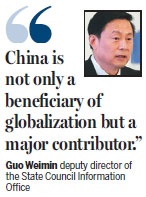Asian media vows to highlight globalization
Asian media will make a "stronger case" for globalization, regional news leaders vowed at the Boao Forum for Asia Annual Conference on Thursday.
Guo Weimin, deputy director of the State Council Information Office, said that in the wake of anti-globalization sentiment, the media should retain a global perspective and uphold the idea of inclusive growth through cooperation.
"China is not only a beneficiary of globalization but a major contributor," said Guo. He noted that the Belt and Road Initiative that President Xi Jinping proposed three years ago has received warm applause from the international community.

"The initiative is not only about interconnectivity, but also dialogues on an equal footing," said Guo, "We hope the media will play an active role in deepening exchanges and creating more development opportunities for every country."
Jenny Shipley, director of the Boao Forum for Asia and a former prime minister of New Zealand, echoed Guo's remarks. She said the media should work to ensure that globalization is "something to be proud of, rather than to fear", and should explain the challenges.
The media should also help with social inclusion and ensure the balance of worldwide development, said Shipley.
Bayarsaikhan Bider, director-general of Mongolian National Broadcaster, said it is his third time attending the Media Leaders Roundtable in Boao, Hainan province. He added that he proposed to set up a new media alliance to enable content sharing and cooperation.
He cited the broadcast of a popular Chinese TV series in Mongolia as an example: "We hope that such sharing will extend to other Asian countries."
The voice of Asia has been weak compared to the West, due to language barriers and cultural differences, which shows the need for a cooperation platform, said Ge Wei, chairman of China Fortune Media Group, concluding a panel discussion.
daitian@chinadaily.com.cn


















